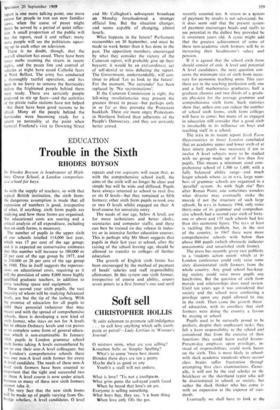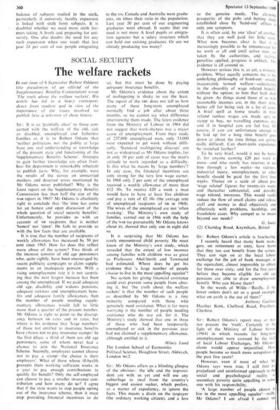EDUCATION
Trouble in the Sixth
RHODES BOYSON
Dr Rhodes Boyson is headmaster of High- bury Grove School, a London comprehen- sive school for boys.
As with the supply of teachers, so with that typical British institution, the sixth form: the dangerous assumption is made that all expansion of numbers is good, irrespective of what, if anything, sixth form pupils are studying and how these forms are organised. Yet educational costs are soaring and a critical analysis of all expenditure, including that on sixth forms, is necessary.
The number of pupils in the upper sixth of our schools totalled 114,000 last year, which was 17 per cent of the age group; and it is expected on conservative estimates that this number will increase to 180,000 or 23 per cent of the age group by 1977, and to 210,000 or 26 per cent of the age group by 1980. This in itself suggests the repercus- sions on educational costs, requiring as it will the provision of some 8,000 more highly qualified graduate teachers, in addition to extra teaching space and equipment.
These second year sixth pupils, the vast majority of whom• will be studying Advanced levels, are but the tip of the iceberg. With the promise of education for all pupils to fulfil their potential (whatever that may mean) and with the spread of comprehensive schools, there is developing a new kind of sixth former, who stays on not for A levels but to obtain Ordinary levels and CSE passes or to complete some form of general educa- tion which is non-examinable. In January 1968, pupils in London grammar school sixth forms taking A levels outnumbered by ten to one their non-A level colleagues; but in London's comprehensive schools there was one non-A level sixth former for every A level candidate. The needs of these non-A level sixth formers have been counted so important that the tight and successful two or three A level course is now under attack because so many of these new sixth formers cannot take it.
The very fact that the new sixth forms will be made up of pupils varying from Ox- bridge scholars, A level candidates, 0 level repeats and CSE aspirants will mean that, as with the comprehensive school itself, the aims of the sixth will no longer be clear and simple but will be wide and diffused. Pupils have always returned to school to resit five or six 0 levels—but they remained as fifth formers; other sixth form pupils re-took one or two 0 levels whilst engaged on their A level course for university entry.
The needs of our age, below A level, are for more technicians and better clerks, secretaries and computer staffs; and these can best be trained on day release in indus- try or in intensive further education courses. This is perhaps why Mr Short suggests that pupils in their last year at school, after the raising of the school leaving age, should be allowed to transfer to colleges of further education.
The growth of English sixth forms has been encouraged by the method of payment of heads' salaries and staff responsibility allowances. In this system one sixth former, irrespective of course and ability, counts seven points to a first former's one and until
recently counted ten. A return to a system of payment by results is not advocated; bu. it does seem odd that the present system of payment encourages heads and staffs to see potential in the dullest boy provided he is seventeen years old. A cynic might add that the greatest achievement of some of these non-academic sixth formers will be in increasing their headmaster's salary and pension.
If it is agreed that the school sixth form should consist of only A level and potential A level candidates, the next question con- cerns the minimum size of sixth form neces- sary for economic teaching units. This year there are in the teaching profession only one and a half mathematics graduates, half a graduate chemist and two thirds of a gradu- ate physicist for the average grammar and comprehensive sixth form. Such statistics show that, unless one can reduce the number of school sixth forms, sixth form colleges will have to come; but many of us engaged in education still consider that a good sixth is invaluable in its influence on boys and teaching staff in a school.
The ILEA in its recent report Sixth Form Opportunities in Inner London concluded that an academic upper and lower sixth of at least ninety pupils was necessary if ten to twelve A level subjects were to be studied with no group made up of less than five pupils. This means a minimum sized com- prehensive school of 1,300 to 1,400, with a fully balanced ability range—and much larger schools where, as in ILEA, large num- bers of grammar schools are organised in a `parallel' system. As with 'high rise' flats after Ronan Point, one sometimes wonders what disaster may eventually strike the morale if not the structure of such large schools. In ILEA in January 1968, only some thirty-nine of its grammar and comprehen- sive schools had a second year sixth of forty- one or above and 135 such schools had less than this economic figure. The ILEA at least is tackling this problem, but, in the rest of the country, in 1967 there were more comprehensive schools with below than above 800 pupils (which obviously indicates uneconomic and unsatisfied sixth forms).
The press has recently given vast publicity to a 'students action union' which at its London conference could only raise some sixty disorientated sixth formers from the whole country. Any good school bee-keep- ing society could raise more pupils any lunch-time. But the question of sixth form morale and relationships does need review. Until ten years ago it was considered that society and the school were conferring a privilege upon any pupil allowed to stay in the sixth. Then came the growth theor• of education, with its corollary that sixth formers were doing the country a favour by staying at school.
Pupils used to be naturally proud to be prefects, despite their unpleasant tasks; they felt a keen responSibility to the school and considered that from the exercise of their functions they could learn useful lessons. Present-day emphasis upon privileges, in- stead of responsibilities, could work havoc on the sixth. This is most likely in school.. with slack academic standards where second class brains suffer frustration througi- attempting first class examinations. Gener- ally, it will not be the real scholar or the bricklayer or the shorthand typist who will be disorientated in school, or society, but rather the slack thinker who has come it with an expansion at the expense of stan- dards.
Eventually we shall have to look at the balance of subjects studied in the sixth, particularly if university faculty expansion is linked with sixth form subjects. It is doubtful whether we need more sixth for- mers taking A levels and preparing for uni- versity. One also doubts the need for any such expansion when one reads that last year 24 per cent of our people emigrating to the us, Canada and Australia were gradu- ates, six times their ratio in the population. Last year 50 per cent of our engineering graduates went abroad. It seems that our need is not more A level pupils or emigra- tion agencies but a salary structure which can hold our existing graduates. Or are we already producing too many?









































 Previous page
Previous page